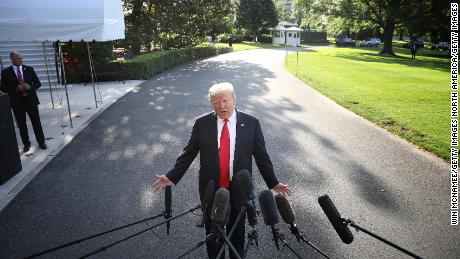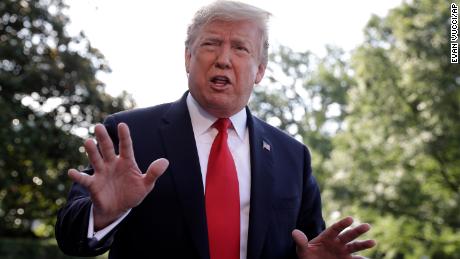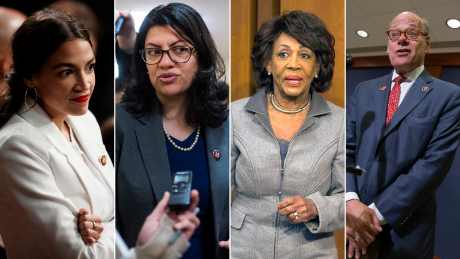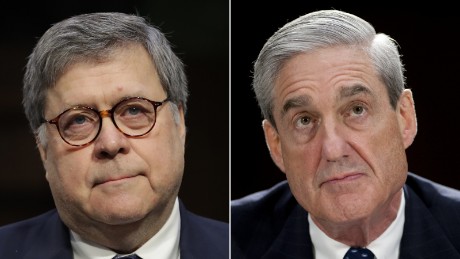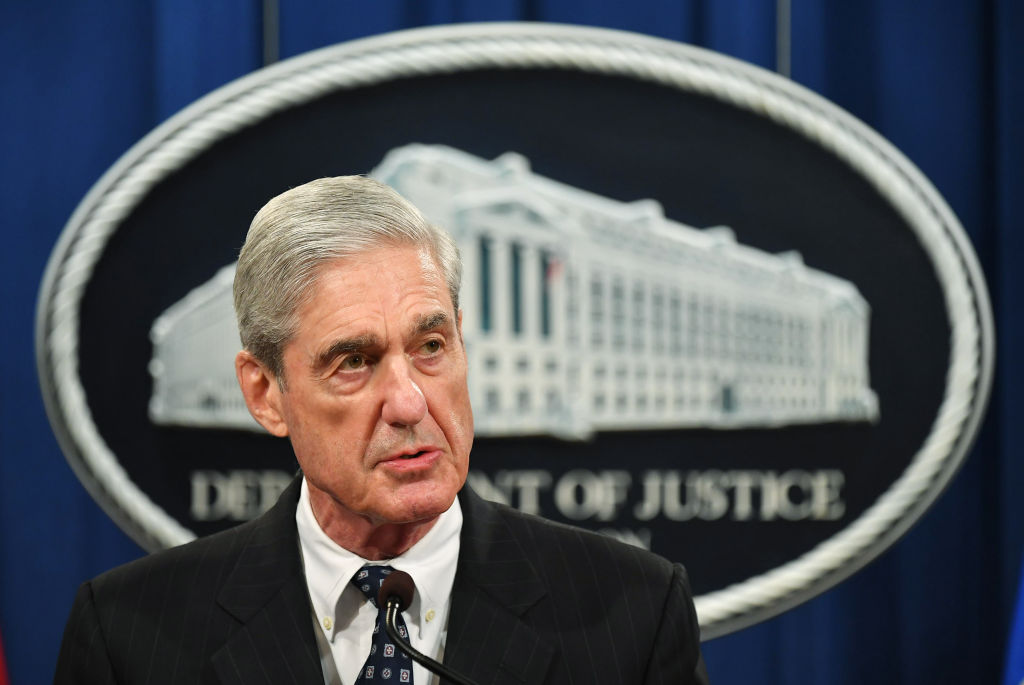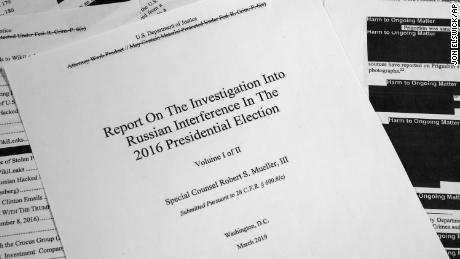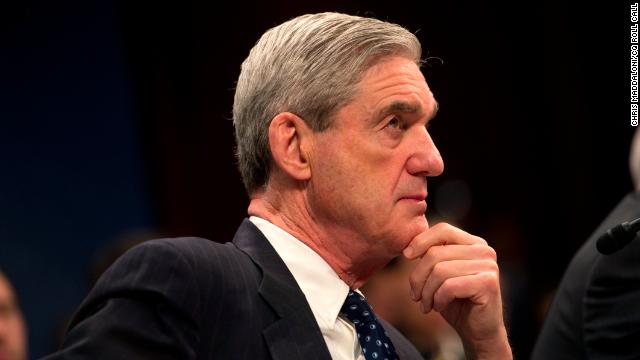Passing mentions of Trump had cropped up in a draft document prepared by special counsel
Robert Mueller‘s office that detailed Roger Stone’s efforts to obtain hacked materials from WikiLeaks in 2016. And while Trump was not accused of any wrongdoing, the document’s references to the President irked his lawyers to the point of nearly derailing plans for the President to submit written answers to prosecutors’ questions after months of protracted negotiations.
It was the kind of crisis that members of the President’s legal defense team thought called for Mueller to be in attendance.
Mueller apparently didn’t agree and didn’t attend.
For nearly two years, indictments bore the signature of the 74-year-old Justice Department veteran, as he served as the public face of the most high-profile investigation in decades, but he never uttered a single public word about his work.
Breaking his silence for the first time on Wednesday, Mueller said the work of the special counsel’s office “speaks for itself.” But the contours of his role on the investigation are still largely cloaked in secrecy.
A dozen CNN interviews with those who have worked by Mueller’s side or dealt regularly with his office offer somewhat conflicting depictions, but for many he served as an enigmatic figure.
He attended some interviews of key witnesses, such as former White House counsel Don McGahn, observing questions and exchanging polite greetings but not participating. Other witnesses pivotal in the Russia investigation, like former Trump campaign chairman Paul Manafort, didn’t see him at all.
The President’s lawyers rarely spoke to him. He met only once with the legal team comprised of Jane and Marty Raskin, Rudy Giuliani and Jay Sekulow, according to sources familiar with the interactions.
He never appeared at any Justice Department press conference announcing charges or in court.
That’s not surprising, however, to those familiar with his managerial style who suggest that the media and larger public narrative built up a folklore around Mueller that doesn’t match reality.
“We’ve created this mythology around Mueller,” said one former official who worked closely with him and suggested it would be “unrealistic” to expect Mueller to exert a heavy hand, especially when surrounded by a team of experienced prosecutors.
Another official said his style going back to his days as FBI director was to set tone and expectations, and signing off on decisions, but leaving his team to do their work without micromanagement.
Mueller’s reputation, earned over years that stretched from heroic military service to highly regarded prosecutor and FBI director, also helped protect the investigation against the relentless attacks of Trump and his allies.
But after his initial appointment as special counsel in May 2017, his fingerprints become harder to trace, and questions still remain about his part in the investigation, even as his time at the Justice Department has come to a close.
‘);$vidEndSlate.removeClass(‘video__end-slate–inactive’).addClass(‘video__end-slate–active’);}};CNN.autoPlayVideoExist = (CNN.autoPlayVideoExist === true) ? true : false;var configObj = {thumb: ‘none’,video: ‘politics/2019/05/30/robert-mueller-most-silent-man-in-washington-jeanne-moos-ebof-vpx.cnn’,width: ‘100%’,height: ‘100%’,section: ‘domestic’,profile: ‘expansion’,network: ‘cnn’,markupId: ‘body-text_19’,theoplayer: {allowNativeFullscreen: true},adsection: ‘const-article-inpage’,frameWidth: ‘100%’,frameHeight: ‘100%’,posterImageOverride: {“mini”:{“width”:220,”type”:”jpg”,”uri”:”//cdn.cnn.com/cnnnext/dam/assets/190529113603-11-mueller-presser-0529-small-169.jpg”,”height”:124},”xsmall”:{“width”:307,”type”:”jpg”,”uri”:”//cdn.cnn.com/cnnnext/dam/assets/190529113603-11-mueller-presser-0529-medium-plus-169.jpg”,”height”:173},”small”:{“width”:460,”type”:”jpg”,”uri”:”//cdn.cnn.com/cnnnext/dam/assets/190529113603-11-mueller-presser-0529-large-169.jpg”,”height”:259},”medium”:{“width”:780,”type”:”jpg”,”uri”:”//cdn.cnn.com/cnnnext/dam/assets/190529113603-11-mueller-presser-0529-exlarge-169.jpg”,”height”:438},”large”:{“width”:1100,”type”:”jpg”,”uri”:”//cdn.cnn.com/cnnnext/dam/assets/190529113603-11-mueller-presser-0529-super-169.jpg”,”height”:619},”full16x9″:{“width”:1600,”type”:”jpg”,”uri”:”//cdn.cnn.com/cnnnext/dam/assets/190529113603-11-mueller-presser-0529-full-169.jpg”,”height”:900},”mini1x1″:{“width”:120,”type”:”jpg”,”uri”:”//cdn.cnn.com/cnnnext/dam/assets/190529113603-11-mueller-presser-0529-small-11.jpg”,”height”:120}}},autoStartVideo = false,isVideoReplayClicked = false,callbackObj,containerEl,currentVideoCollection = [],currentVideoCollectionId = ”,isLivePlayer = false,mediaMetadataCallbacks,mobilePinnedView = null,moveToNextTimeout,mutePlayerEnabled = false,nextVideoId = ”,nextVideoUrl = ”,turnOnFlashMessaging = false,videoPinner,videoEndSlateImpl;if (CNN.autoPlayVideoExist === false) {autoStartVideo = false;if (autoStartVideo === true) {if (turnOnFlashMessaging === true) {autoStartVideo = false;containerEl = jQuery(document.getElementById(configObj.markupId));CNN.VideoPlayer.showFlashSlate(containerEl);} else {CNN.autoPlayVideoExist = true;}}}configObj.autostart = CNN.Features.enableAutoplayBlock ? false : autoStartVideo;CNN.VideoPlayer.setPlayerProperties(configObj.markupId, autoStartVideo, isLivePlayer, isVideoReplayClicked, mutePlayerEnabled);CNN.VideoPlayer.setFirstVideoInCollection(currentVideoCollection, configObj.markupId);videoEndSlateImpl = new CNN.VideoEndSlate(‘body-text_19’);function findNextVideo(currentVideoId) {var i,vidObj;if (currentVideoId && jQuery.isArray(currentVideoCollection) && currentVideoCollection.length > 0) {for (i = 0; i 0) {videoEndSlateImpl.showEndSlateForContainer();if (mobilePinnedView) {mobilePinnedView.disable();}}}}callbackObj = {onPlayerReady: function (containerId) {var playerInstance,containerClassId = ‘#’ + containerId;CNN.VideoPlayer.handleInitialExpandableVideoState(containerId);CNN.VideoPlayer.handleAdOnCVPVisibilityChange(containerId, CNN.pageVis.isDocumentVisible());if (CNN.Features.enableMobileWebFloatingPlayer &&Modernizr &&(Modernizr.phone || Modernizr.mobile || Modernizr.tablet) &&CNN.VideoPlayer.getLibraryName(containerId) === ‘fave’ &&jQuery(containerClassId).parents(‘.js-pg-rail-tall__head’).length > 0 &&CNN.contentModel.pageType === ‘article’) {playerInstance = FAVE.player.getInstance(containerId);mobilePinnedView = new CNN.MobilePinnedView({element: jQuery(containerClassId),enabled: false,transition: CNN.MobileWebFloatingPlayer.transition,onPin: function () {playerInstance.hideUI();},onUnpin: function () {playerInstance.showUI();},onPlayerClick: function () {if (mobilePinnedView) {playerInstance.enterFullscreen();playerInstance.showUI();}},onDismiss: function() {CNN.Videx.mobile.pinnedPlayer.disable();playerInstance.pause();}});/* Storing pinned view on CNN.Videx.mobile.pinnedPlayer So that all players can see the single pinned player */CNN.Videx = CNN.Videx || {};CNN.Videx.mobile = CNN.Videx.mobile || {};CNN.Videx.mobile.pinnedPlayer = mobilePinnedView;}if (Modernizr && !Modernizr.phone && !Modernizr.mobile && !Modernizr.tablet) {if (jQuery(containerClassId).parents(‘.js-pg-rail-tall__head’).length) {videoPinner = new CNN.VideoPinner(containerClassId);videoPinner.init();} else {CNN.VideoPlayer.hideThumbnail(containerId);}}},onContentEntryLoad: function(containerId, playerId, contentid, isQueue) {CNN.VideoPlayer.showSpinner(containerId);},onContentPause: function (containerId, playerId, videoId, paused) {if (mobilePinnedView) {CNN.VideoPlayer.handleMobilePinnedPlayerStates(containerId, paused);}},onContentMetadata: function (containerId, playerId, metadata, contentId, duration, width, height) {var endSlateLen = jQuery(document.getElementById(containerId)).parent().find(‘.js-video__end-slate’).eq(0).length;CNN.VideoSourceUtils.updateSource(containerId, metadata);if (endSlateLen > 0) {videoEndSlateImpl.fetchAndShowRecommendedVideos(metadata);}},onAdPlay: function (containerId, cvpId, token, mode, id, duration, blockId, adType) {/* Dismissing the pinnedPlayer if another video players plays an Ad */CNN.VideoPlayer.dismissMobilePinnedPlayer(containerId);clearTimeout(moveToNextTimeout);CNN.VideoPlayer.hideSpinner(containerId);if (Modernizr && !Modernizr.phone && !Modernizr.mobile && !Modernizr.tablet) {if (typeof videoPinner !== ‘undefined’ && videoPinner !== null) {videoPinner.setIsPlaying(true);videoPinner.animateDown();}}},onAdPause: function (containerId, playerId, token, mode, id, duration, blockId, adType, instance, isAdPause) {if (mobilePinnedView) {CNN.VideoPlayer.handleMobilePinnedPlayerStates(containerId, isAdPause);}},onTrackingFullscreen: function (containerId, PlayerId, dataObj) {CNN.VideoPlayer.handleFullscreenChange(containerId, dataObj);if (mobilePinnedView &&typeof dataObj === ‘object’ &&FAVE.Utils.os === ‘iOS’ && !dataObj.fullscreen) {jQuery(document).scrollTop(mobilePinnedView.getScrollPosition());playerInstance.hideUI();}},onContentPlay: function (containerId, cvpId, event) {var playerInstance,prevVideoId;if (CNN.companion && typeof CNN.companion.updateCompanionLayout === ‘function’) {CNN.companion.updateCompanionLayout(‘restoreEpicAds’);}clearTimeout(moveToNextTimeout);CNN.VideoPlayer.hideSpinner(containerId);if (Modernizr && !Modernizr.phone && !Modernizr.mobile && !Modernizr.tablet) {if (typeof videoPinner !== ‘undefined’ && videoPinner !== null) {videoPinner.setIsPlaying(true);videoPinner.animateDown();}}},onContentReplayRequest: function (containerId, cvpId, contentId) {if (Modernizr && !Modernizr.phone && !Modernizr.mobile && !Modernizr.tablet) {if (typeof videoPinner !== ‘undefined’ && videoPinner !== null) {videoPinner.setIsPlaying(true);var $endSlate = jQuery(document.getElementById(containerId)).parent().find(‘.js-video__end-slate’).eq(0);if ($endSlate.length > 0) {$endSlate.removeClass(‘video__end-slate–active’).addClass(‘video__end-slate–inactive’);}}}},onContentBegin: function (containerId, cvpId, contentId) {if (mobilePinnedView) {mobilePinnedView.enable();}/* Dismissing the pinnedPlayer if another video players plays a video. */CNN.VideoPlayer.dismissMobilePinnedPlayer(containerId);CNN.VideoPlayer.mutePlayer(containerId);if (CNN.companion && typeof CNN.companion.updateCompanionLayout === ‘function’) {CNN.companion.updateCompanionLayout(‘removeEpicAds’);}CNN.VideoPlayer.hideSpinner(containerId);clearTimeout(moveToNextTimeout);CNN.VideoSourceUtils.clearSource(containerId);jQuery(document).triggerVideoContentStarted();},onContentComplete: function (containerId, cvpId, contentId) {if (CNN.companion && typeof CNN.companion.updateCompanionLayout === ‘function’) {CNN.companion.updateCompanionLayout(‘restoreFreewheel’);}navigateToNextVideo(contentId, containerId);},onContentEnd: function (containerId, cvpId, contentId) {if (Modernizr && !Modernizr.phone && !Modernizr.mobile && !Modernizr.tablet) {if (typeof videoPinner !== ‘undefined’ && videoPinner !== null) {videoPinner.setIsPlaying(false);}}},onCVPVisibilityChange: function (containerId, cvpId, visible) {CNN.VideoPlayer.handleAdOnCVPVisibilityChange(containerId, visible);}};if (typeof configObj.context !== ‘string’ || configObj.context.length 0) {configObj.adsection = window.ssid;}CNN.autoPlayVideoExist = (CNN.autoPlayVideoExist === true) ? true : false;CNN.VideoPlayer.getLibrary(configObj, callbackObj, isLivePlayer);});CNN.INJECTOR.scriptComplete(‘videodemanddust’);
‘Classic Bob Mueller’
In the immediate days following Mueller’s appointment as special counsel in late spring 2017, his office reached out to top officials at the FBI and tried to get up to speed quickly. There was a massive amount of information to digest in a short amount of time and Mueller was ready to dig in, according to one former official.
Mueller, along with his two top deputies, James Quarles and Aaron Zebley, went over to the FBI for a lengthy briefing and as the official described it, he was “Classic Bob Mueller” — engaged, “drilling down,” asking probing questions, trying to get his arms around what cases were opened and why.
FBI officials from the counterintelligence division thought it was important to give Mueller the context and history of the investigation at an elevated level, but Mueller showed his tendency toward learning even the most granular details, and the meeting ended up spanning over three hours.
Once his core team was in place, Mueller did an orientation with the group he’d assembled from across different US attorneys’ offices and FBI bureaus, making clear his expectations, the mission, and how they were going to get the job done. After the meeting was over, he immediately went back to his office to get to work while others caught up with their colleagues — never being one for water cooler, small talk.
The Mueller mythology
Over several weeks last fall, as Manafort, one of the highest-ranking defendants to face charges in the investigation, sat for hours-long interviews at the special counsel’s office, Mueller never participated.
Mueller was present for most of the time McGahn was questioned during the course of the investigation, according to a source familiar with the interview. McGahn’s observations and interactions with Trump ultimately served as critical evidence in the special counsel team’s analysis of whether the President obstructed justice, and Mueller only left the room for roughly an hour, apologizing for his departure, but never asked any questions — that was left up to Quarles and Andrew Goldstein. On the other hand, Mueller did not attend the interview of McGahn’s chief of staff, Annie Donaldson, who took meticulous notes on Trump’s behavior in office.
The President’s own lawyers spoke to Mueller directly only on a few occasions, instead mostly interacting with Quarles, Goldstein and other lawyers in the office.
After the president hired a new legal team in 2018, they met with Mueller and his team to introduce themselves. The Trump team thought one of the advantages of hiring Jane and Marty Raskin was their past as colleagues with Mueller and Quarles. Jane Raskin worked with Mueller at the Justice Department, and she later worked with Quarles in private practice.
Last November, Trump’s legal team prepared to provide written answers to a list of questions the Mueller team had provided months earlier on his actions prior to the inauguration. It was a deal that resolved months of battling over prosecutors’ request for a sit-down interview of the President.
The Trump team learned that Mueller’s prosecutors had mentioned the President by name in draft court paperwork related to a proposed plea deal they were pushing Jerome Corsi to sign. Corsi had no formal role on the Trump campaign but was an acquaintance of
Roger Stone, a political adviser to then-candidate Trump.
The document, known as a “Statement of the Offense,” didn’t accuse Trump of any crime. But the President’s lawyers were fuming that Trump was even mentioned by name while others were anonymized.
The Trump lawyers, led by Jay Sekulow and Jane Raskin, protested to Quarles, and the following day, they drove a few blocks to meet with Ed O’Callaghan, the senior official in Deputy Attorney General Rod Rosenstein’s office, who led day-to-day oversight of the Mueller investigation.
Members of the President’s legal team were surprised that Mueller didn’t show up given that they had specifically requested to meet with him at the Justice Department, a person familiar with the meeting says, although Mueller had not directly promised to attend.
Corsi ultimately made the document public, but he didn’t sign a plea agreement and the special counsel’s office didn’t file any charges against him.
As the investigation marched on, the Raskins dealt almost exclusively with Quarles over months of back and forth talks.
The fact that Mueller didn’t attend interviews of key witnesses or participate in certain meetings can be understood when his role is viewed through the prism of his history said one former official who worked closed with him.
“The role that he’s most familiar with and has done most recently is FBI director — the leader of the investigators,” the former official explained. As a result, it would be “unrealistic” to expect Mueller to hover over his team.
But that’s also not to say he’d be prone to let his team run over him.
“Nobody rolls Bob Mueller,” said the former official.
‘Very, very little, virtually no contact’
After weeks of speculation, Mueller made clear Wednesday he has no interest in appearing before Congress voluntarily, suggesting his team’s exhaustive report on the Russia investigation “is my testimony.”
“I hope and expect this to be the only time that I will speak to you in this manner,” Mueller said.
Lawmakers heard little directly from Mueller himself during the investigation as well.
When the special counsel was first appointed, Mueller went to Capitol Hill for a series of meetings with leaders of congressional committees that were also investigating Russian interference in the 2016 election.
But that apparently was the end of his interaction with lawmakers.
“Once,” GOP Sen. Chuck Grassley of Iowa said when asked how many times he had spoken to Mueller. Grassley, who was Senate Judiciary chairman in the last Congress, said he and Sen. Dianne Feinstein, the panel’s top Democrat, met with Mueller to talk about process and how they would interact.
“It was kind of how do we communicate? And I never talked to him after that,” Grassley said.
Virginia Sen. Mark Warner, the top Democrat on the Senate Intelligence Committee, said he also had a single conversation with Mueller after he was appointed.
“We had one interaction at the very beginning in the process, and I have not spoken to him since,” Warner said.
Lawmakers and congressional aides say that the primary purpose of Mueller’s Capitol Hill meetings was to discuss how to avoid getting in each other’s way, so that the congressional probes did not interfere with the special counsel’s criminal investigation. But after Mueller made his initial rounds, the special counsel’s team and congressional liaison did all further communicating with Congress.
“It was more staff doing deconfliction,” said Senate Intelligence Chairman Richard Burr.
Over the life of the nearly two-year investigation, conversation went almost entirely in one direction, aides say. The committees would also check in with the special counsel’s office before taking various actions and congressional investigators, for instance, provided Mueller’s team with interview transcripts when requested, but the special counsel’s office provided almost no information about its ongoing work back to the committees, aides say.
“There was very, very little, virtually no contact” with the special counsel’s office throughout the course of the investigation, Warner said.
And after making clear Wednesday he hopes not to testify, the question now is whether Mueller will be forced nevertheless to answer lawmakers’ questions about his
448-page report.
House Judiciary Chairman Jerry Nadler wouldn’t say Wednesday whether he’s willing to issue a subpoena for the testimony, but Mueller said he would not provide any information “beyond that which is already public in any appearance before Congress.”
Those who know Mueller say his reluctance to enter the political maelstrom of appearing before Congress is to be expected.
“He’s never been a guy who likes the spotlight,” the former official explained. “He wants to stay out of the circus as much as you can.”







